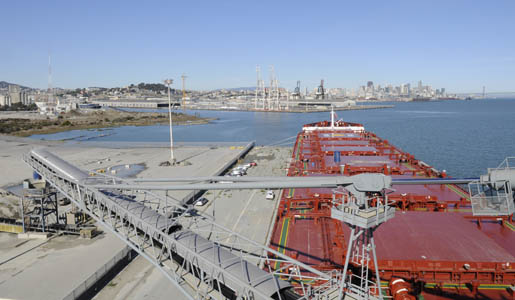A promising new cargo enterprise was unveiled at the Port of San Francisco late last month when it welcomed the Rt. Hon. Paul E. Martin—a 71,900-deadweight-ton self-unloading bulk carrier.

The Rt. Hon. Paul E. Martin, a 71,900-deadweight-ton self-unloading bulk carrier operated by CSL International, made her maiden call at Port of San Francisco’s Pier 94 last month. Photo courtesy of Port of SF
By Patrick Burnson
Published: December, 2012
A promising new cargo enterprise was unveiled at the Port of San Francisco late last month when it welcomed the Rt. Hon. Paul E. Martin—a 71,900-deadweight-ton self-unloading bulk carrier.
The vessel, operated by CSL International, made her maiden call at Pier 94, operated by Hanson Aggregates. Hanson imports over 700,000 tons of aggregate and sand into the Port of San Francisco annually. "We are pleased to welcome the newest CSL International vessel to our port," said Port Maritime Director Peter Dailey. "The dry bulk sector is one of the key components of our maritime business portfolio at the Port of San Francisco."
The vessel loaded cargo in British Columbia before arriving at Pier 94 to discharge 64,000 tons of aggregate and sand. This product is used by the local construction industry for the production of concrete. As part of CSL’s ambitious fleet renewal program, Paul E. Martin is the first of three Trillium Class self-unloading Panamax vessels to join the CSL International pool during the coming year.
Jim Maloney, the port’s maritime marketing manager, said this will be a regular deployment. "In fact, the Paul E. Martin will be back at Pier 94 to discharge additional sand and aggregate from British Columbia for Hanson Aggregates on December 17. The vessel will also make regular calls at the Port of Redwood City and Levin Richmond Terminal to discharge CEMEX and Eagle Rock materials."
CSL International, based in Boston, is a division of the CSL Group, the world’s largest owner and operator of self-unloading vessels and a global leader in marine dry bulk cargo handling and delivery services. The vessel was named in honor of Canada’s 21st Prime Minister and former owner of the CSL Group.
"Hanson Aggregates has been working with CSL International as their principal carrier for many years now," said Maloney. "Some of the sister vessels of the Paul E. Martin that have called here in recent years include the Sophie Oldendorff, the Pioneer, the Nelvana, the CSL Acadian and the Henry Jackman.
Hanson Aggregates’ volumes have increased significantly over the past two years (up 83 percent last year over 2010), and the port’s dry bulk overall increased 43 percent last year over the previous year. CEMEX is another major bulk aggregates importer for the Port of San Francisco as well, supplying their Pier 92 concrete batch plant with aggregates from British Columbia.
"Volumes for 2012 are holding steady and are trending slightly upward from 2011 as local construction projects are creating a strong uptick in demand for concrete," said Maloney.
Port of Oakland Update
In a letter to stakeholders, the port’s acting executive director, Deborah Ale Flint, provided an update on the investigation into alleged improper expenditures late last month:
"I am as disappointed as you are at the allegations of improper expenditures. As Acting Executive Director, I take these allegations seriously, and assure you that we are acting as swiftly and thoroughly as possible to address them," she said.
Flint also noted that the port has hired an international law firm, Arnold & Porter, to serve as independent outside counsel in the ongoing investigation.
"They are working methodically, and as quickly as responsible and possible," she added. "We do not know how long it is going to take, and cannot prejudge in our minds or actions what they will conclude. We have also taken decisive personnel action to ensure business continuity, but without prejudging the investigation. Simultaneously, we are accelerating work to strengthen our policies and procedures. We intend to communicate with the public on these matters as soon as new information is available."
While the port has taken these decisive actions on the issue of alleged improper expenditures, it also continues its progress toward financial sustainability on other fronts.
For example, it recently refinanced some of its $1.3 billion in outstanding debt to achieve $60 million in net present value savings. These savings are spread over many years, and will save about $9 million a year from 2014 to 2020, which will help the port address increasing costs and over $850 million in unfunded liabilities and capital needs.
"While we are making progress toward financial sustainability, addressing allegations of past improper expenditures, strengthening our policies, and seeking sustainable labor contracts, we must also keep our 24/7 job-creating business operations running," said Flint.

